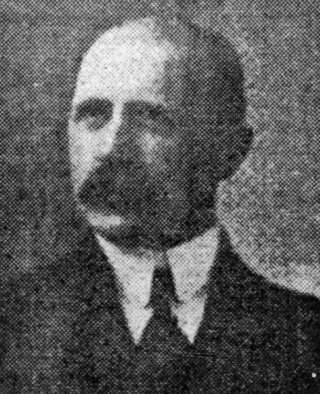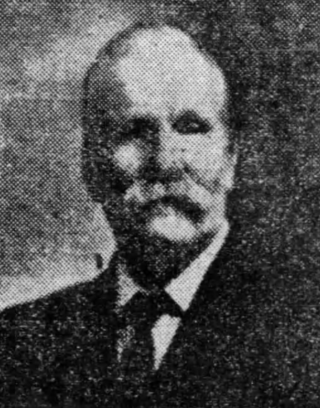
The Alaska boundary dispute was a territorial dispute between the United States and the United Kingdom of Great Britain and Ireland, which then controlled Canada's foreign relations. It was resolved by arbitration in 1903. The dispute had existed between the Russian Empire and Britain since 1821, and was inherited by the United States as a consequence of the Alaska Purchase in 1867. The final resolution favored the American position, as Canada did not get an all-Canadian outlet from the Yukon gold fields to the sea. The disappointment and anger in Canada was directed less at the United States, and more at the British government for betraying Canadian interests in favor of healthier Anglo-American relations.
The 1907 British Columbia general election was the eleventh general election for the Province of British Columbia, Canada. It was held to elect members of the Legislative Assembly of British Columbia. The election called on December 24, 1906, and held on February 2, 1907. The new legislature met for the first time on March 7, 1907.

Thomas Gifford was a politician in British Columbia, Canada.

William Manson was a Scottish-born accountant, notary public and political figure in British Columbia, Canada. He represented Alberni from 1905 to 1907 and Skeena from 1909 to 1915 in the Legislative Assembly of British Columbia as a Conservative.
Thomas Kidd was an Irish-born farmer and political figure in British Columbia, Canada. He represented Westminster-Richmond in the Legislative Assembly of British Columbia from 1894 to 1903. He did not seek a fourth term in the Legislature in the 1903 provincial election.
George Bohun Martin was an English-born farmer, rancher and political figure in British Columbia, Canada. He represented Yale from 1882 to 1894 and Yale-North from 1894 to 1898 in the Legislative Assembly of British Columbia.
Charles Wilson was an English-born lawyer and political figure in British Columbia. He represented Cariboo from 1882 to 1886 as an Independent member and Vancouver City from 1903 to 1906 as a Conservative in the Legislative Assembly of British Columbia.
The 7th Legislative Assembly of British Columbia sat from 1894 to 1898. The members were elected in the British Columbia general election held in July 1894. Theodore Davie served as Premier until 1895 when he was named Chief Justice for the Supreme Court. John Herbert Turner succeeded Davie as Premier.
James Alexander MacDonald was a lawyer, judge and political figure in British Columbia. He represented Rossland City in the Legislative Assembly of British Columbia from 1903 to 1909 as a Liberal. MacDonald was the first leader of the British Columbia Liberal Party, serving from 1903 until 1909.
The 9th Legislative Assembly of British Columbia sat from 1900 to 1903. The members were elected in the British Columbia general election held in June 1900. James Dunsmuir served as Premier until he resigned in November 21, 1902. Dunsmuir was succeeded by Edward Gawler Prior, who was dismissed by the lieutenant governor for conflict of interest. Richard McBride became Premier in June 1903.

Robert Garnett Tatlow was a businessman and political figure in British Columbia (BC). He represented Vancouver City in the Legislative Assembly of British Columbia from 1900 to 1909 as a BC Conservative.

Archibald McDonald was a general merchant and political figure in British Columbia. He represented Lillooet in the Legislative Assembly of British Columbia from 1903 to 1907 and from 1909 to 1924 as a Conservative.
The 11th Legislative Assembly of British Columbia sat from 1907 to 1909. The members were elected in the British Columbia general election held in February 1907. The British Columbia Conservative Party led by Richard McBride formed the government.
The 12th Legislative Assembly of British Columbia sat from 1910 to 1912. The members were elected in the British Columbia general election held in November 1909. The British Columbia Conservative Party led by Richard McBride formed the government.
James Pearson Shaw was a political figure in British Columbia. He represented Kamloops in the Legislative Assembly of British Columbia from 1909 to 1916 as a Conservative.
The 13th Legislative Assembly of British Columbia sat from 1913 to 1916. The members were elected in the British Columbia general election held in March 1912. The British Columbia Conservative Party led by Richard McBride formed the government. McBride resigned as premier in December 1915 to become British Columbia's agent general in London. William John Bowser succeeded McBride as Premier.

Lorne Argyle Campbell was a businessman and political figure in British Columbia. He represented Rossland City from 1912 to 1916 in the Legislative Assembly of British Columbia as a Conservative.
George Samuel Hanes was an engineer and political figure in British Columbia. He represented North Vancouver from 1916 to 1924 in the Legislative Assembly of British Columbia as a Liberal and then as an Independent.
John Leander Beckwith was an entrepreneur and politician in British Columbia, Canada. He served as mayor of Victoria in 1912.






